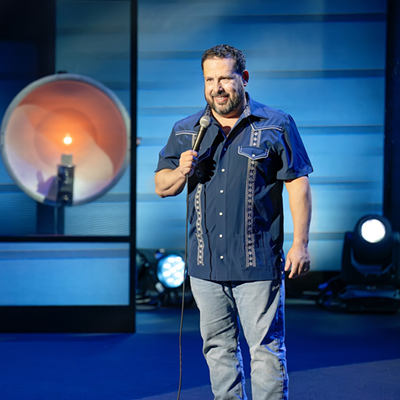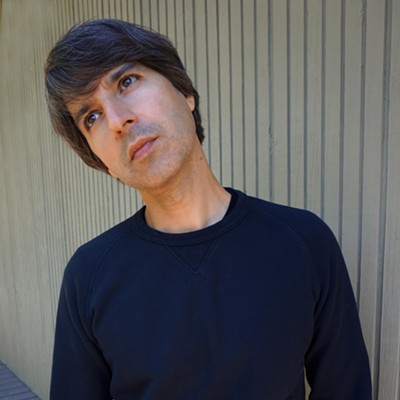It was a sunny one in early September 2001.
"The YMCA workers decided that maybe we shouldn't tell the boys what had just happened," says Shenk, referring to the terrorist attacks. "But later in the day, the boys found out, and you know what? They very much got it. They'd heard about Osama, as he was supposedly behind the embassy bombing in Kenya."
Shenk adds that the boys had a lot on their plate that week.
"They wake up that morning, suddenly not safe in the United States. CNN's blasting all around them. But here they are, just trying to figure out television itself--something they'd never seen before--let alone what a skyscraper is."
Shenk and Mylan were in the middle of filming Lost Boys of Sudan, a feature-length documentary that follows the two Sudanese refugees. They'd already been to the camp where they were introduced to Peter Dut and Santino Chuor. The teens had been orphaned so young that all they knew were the U.N. camps--a safe harbor compared to their trek through the desert facing starvation, attacks by lions and enemy fire.
Thousands of Dinka boys like Dut and Chuor--dubbed The Lost Boys of Sudan--deluged the camps in neighboring Kenya and Ethiopia in the late '80s. They were the lucky ones. Their mothers and sisters were taken into slavery, and their fathers were killed when villages in Southern Sudan were destroyed during a 20-year civil war--a raging battle that continues to pit the northern Islamic fundamentalist government against southern Christian and Animist separatists.
After a decade in the camps, Dut and Chuor found themselves on a list of nearly 4,000 boys who were given high-priority refugee status. Suddenly, they were dumped into the swirl of refugee organizations States-side, landing in Texas just 10 days before the terrorist attacks.
"These boys are the poster kids of refugees," says Shenk from his office in San Francisco. "Their particular circumstances cause people to latch onto them. It has to do with the fact that they're all boys and how young they are. Plus the Christian/Muslim dynamic has tended to get them more attention from resettlement groups here in the States."
"The modern face of immigration has been reconfigured," explains Shenk. "There aren't any boats landing at Ellis Island. Now refugees get on a plane and land in Tucson or Kansas City or Fargo. They're being placed wherever a refugee agency can find a space for them. It's not like they settle in with extended immigrant families."
Indeed, the conventional definition of family is less likely to be understood by the Lost Boys, says Shenk.
"Your peers become your family. These kids were 4 or 5 or 6 when they came through the desert to the camps. For them, it's distant history. It's kind of the opposite of Freudian analysis. It's an interesting lesson for Americans and our own struggles with family dynamics."
Shenk says that it's unfathomable for him to imagine his own 5-year-old son being orphaned and surviving the atrocities these boys did. Ultimately, he thought the film's focus was going to be a story about post-traumatic stress.
"Two things happened though as we got into the story of Peter and Santino. They seemed kind of OK--smiley, warm, charming, even well-adjusted. Certainly hopeful, despite having to find a job, learn the language, go to high school."
He adds Santino was the lonelier of the two boys. "But he also was very earnest. When we met him, he said to us, 'So, you're from California. I want to come to your land and learn the ways of your tribe.'"
Shenk says he wasn't sure he wanted to share his quintessentially American way of life. "You know how we are. We get in our cars and drive to work, come home and watch TV, get our food from the drive-thru."
Refugee adjustment is a long process. Shenk says that in the midst of filming, one of the boys just disappeared.
"We freaked out. We thought Peter got in trouble or worse, hurt. He just moved to Kansas City one day. He didn't even tell his apartment mates. But within an hour, thanks to the network of Lost Boys, we found him. He'd decided to go live with a cousin."
The boys have their ups and downs. Success is measured by going to community college or holding down a job at Wal-Mart. But it's synchronous with the loneliness and alienation faced by any refugee. Goals of returning to Sudan are up there with getting a green card.
Shenk says his film isn't just a travelogue of what happened to the two Lost Boys. "We wanted to get beyond their schtick, their story that's laced with hope and horror. We wanted to film how they navigate alienation but also their own anti-Black rhetoric about African Americans." There's also plenty about their bond as brothers with other Lost Boys.
Shenk adds, "The first thing they do when they get here is get a cell phone or e-mail so they can communicate with each other."
Lost Boys of Sudan screens at 7 p.m. Wednesday, Jan. 28, at The Loft Cinema, 3233 E. Speedway Blvd., as a benefit for IRC Tucson, an international rescue organization. The film's co-director Jon Shenk joins John Majok, a Southern Sudanese Lost Boy re-settled in Tucson, and IRC staff for a post-screening discussion.
Tickets cost $20 and are available in advance by calling the IRC at 319-2128 or at the Loft box office the night of the screening.







